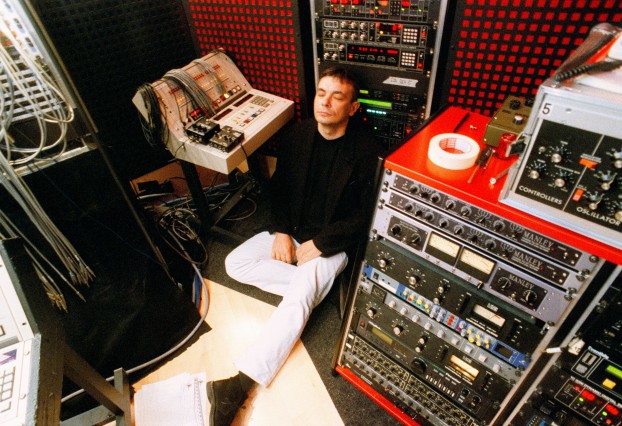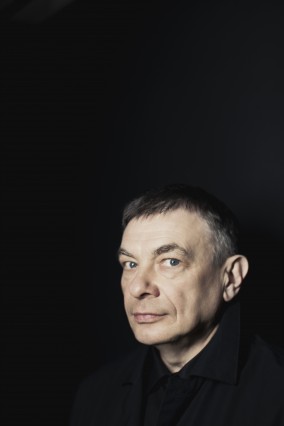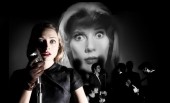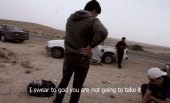Kraftwerk’s legendary Kling Klang studio was famous for containing many weird and wonderful electronic instruments, but one of the strangest was also one of the most mundane: the telephone. In order to avoid any irritating disturbances when the band were at work, it didn’t have a ringer. Occasionally, the story goes, a journalist with the rare opportunity of interviewing the band over the phone would be given a precise time to call, and at that moment one of the band, usually co-founder Ralf Hütter, would pick up the receiver. If there was no one there, he put it down again. That was it. You’d missed your chance. You could try calling as many times as you’d like, but no one would hear you.
Whether the tale is apocryphal or not, Karl Bartos seems less demanding than his former bandmate when it comes to punctuality. Which is fortunate for me, as a delayed train means I stumble into the Corus Hotel near Lancaster Gate fifteen minutes late for our scheduled meeting. If he’s annoyed, he doesn’t show it. Thoughtful and softly spoken while remaining opinionated and fond of speaking (which is fortunate, as this turns out to be his fifth 90-minute interview of the day), the only time he shows any sign of weariness is when he’s asked about musical equipment (presumably a few tech-head journos have been in already). He may have become famous as a robot but he’s relaxed and engaging in reality.
The youngest member of Kraftwerk, he initially joined as a percussionist but went on to be credited with some of their biggest hits, including ‘The Model’ and ‘Computer Love’. He’s also been the most creative since the band’s original line-up fragmented with Flür’s departure in 1987. Quitting himself shortly afterwards, Bartos went on to work with Bernard Sumner and Johnny Marr’s Electronic, collaborate with Mark Bell of LFO fame, and produce two solo albums – 2003’s Communication and this year’s Off The Record, an album inspired by his own archive recordings. Yet the current incarnation of Kraftwerk, featuring only Hütter from the classic line-up, does cast a shadow. While not as outspokenly dismissive as Flür (whose amusingly bitchy review of the Hütter-led line-up’s hometown show earlier this year is worth reading), he still can’t quite bring himself to call them Kraftwerk, instead referring to them as “that band” much as he elsewhere refers to Hitler as “that guy”.
Despite his undiminished association with technology and electronics, he’s surprisingly dismissive of modern gadgets, nodding approvingly when he catches a glance of the scruffy notebook in which my questions are scribbled. “Old school!” he chuckles. “Handwriting is always the best. Don’t trust technology. It’s good to have it, but don’t trust it. Sometimes it breaks my heart if I see a 6-year-old with a tablet playing some silly game”. I mention reading about the invention of the iPotty, a toilet for toddlers with a stand to hold an iPad. He shakes his head, laughing. “No! Oh come on! Where are we gonna go?”. Not wanting to start speculating on the various ways shitting and technology might be combined in the future, we begin the interview by focusing on the past…
Where did the concept for ‘Off The Record’ come from?
Very easy, the guys from the label [Bureau B] approached me and said “Hey Karl, haven’t you got any old tapes in your attic or somewhere in your archive?”, and finally I agreed after they tried a couple of times and didn’t let me go. And I found all these little tape machines, tape recorders, all that stuff. They were all in boxes in my attic, in my studio archive. I put them all into the computer – ‘1977 June 25’, ‘1977 August 5’ – and they looked like a diary. And I thought that might be a good concept for the record, call it an acoustic diary.
You like to present an audiovisual experience live, is that difficult to set up?
It’s quite difficult, yeah.. I need a lot of aspirin! Aspirin and good technical treatment. As soon as you connect together image and sound it’s a different world. For instance, the sound is always much faster being transferred to a speaker than the image being transferred to a screen, so there’s a delay, a very natural delay. You have to get rid of that delay. Technology is very boring sometimes.

Photo: Rüdiger Nehmzow
Did listening back to the recordings bring up any…
Bad memories?
Well not necessarily bad, but any particular emotions?
Have you ever gone back to your parents at Christmas with your brothers and sisters and family, and then somebody gets out an box of old photographs? “Look here, this is you on your first school day, and this is you when we went to holiday at the seaside,” and you see yourself and suddenly you recognise – everything is past. But you’re quite young, you’re not so familiar to this concept. You’re in your twenties?
28.
28. I’m 60. And I still remember the time when I was 28. And soon maybe, if you hit 40 or 45, you become familiar to this concept more and more. Life is like going to the ocean. You take a swim and you can’t see the other side, it’s just open, an endless ocean. But growing older you see the other side, and towards the end of your life you go onto this other side. And there is nothing. And your life is behind you. So this is my perception of life. And those thoughts I had when I was going through my archive, they are bittersweet.
The concept of nostalgia is generally looked at as quite a positive thing – people often wallow in nostalgia or enjoy nostalgic experiences – but there is a kind of sadness to it as well…
Yeah, but nostalgia is drowning in your own tears. I’m not talking about nostalgia, I’m talking about understanding the concept of life, and that it’s beautiful like it is. And we have to surrender to the concept of life, sooner or later. And better sooner, because there is no way around it! We have to understand this deep meaning of ‘everything must pass’. Nobody knows why, but that’s our life.
Does that relate to how you compiled this album? Rather than simply collating the archive recordings and presenting them as a historical document, you decided to update them and do something new with them…
I did, I updated them. They were cool in a way, the first recordings. They were just innocent and naïve but full of energy because I didn’t see ‘the other side’. Like you! [laughs]. 28 is a really good time. Believe me! It’s fantastic, because you can’t see the other side. You just feel like life goes on forever. And it’s good that you do. But then it’s changing, and the funny thing with growing old is you still remember being 17, being 18. You take this with you all the way. Unfortunately, your body doesn’t! Being a musician and composing music, you try to put everything you know at 28 in just one single bar, so everything is just pouring out of you all the time. It was so funny to see what I had done as a youngster, being so naïve, and just putting it into order. It put it in perspective and was really good fun at the same time. I was laughing quite a lot actually!
Why did you resist doing the album when the label first asked you to?
Because it’s much work! It’s boring work, you know? It’s piles of written music and boxes on the shelf. You don’t wanna do it, basically. And I’m lazy. I’m a lazy bastard sometimes. But on the other hand I know how to work academically, you have to devote yourself sometimes in order to get a really good product. You have to find your devotion to it. And I did. You have to believe in the result. If you don’t believe in it then you are going to lose your motivation on the way.
In what ways did you plan to modernise the music?
You can’t modernise music. It’s impossible. How are you able to modernise Mozart or Beethoven? It’s impossible, it’s music. It’s a statement. You can modernise the production, you can play Bach with a synthesizer, but the music won’t change. The most important thing in music is definitely pitch; in other words, melody. And you can’t modernise a melody – it’s impossible.
There’s a hypothesis that the reason melody was so important to Kraftwerk was because at the beginning you didn’t have polyphonic synthesizers…
It was one of the reasons, but we were coming really from the stone age. And in the early days you had to come up first with an idea. Whereas nowadays you have a program on your laptop. You open your laptop and there’s a program, and the program tells you “please fill in here this and that”. I don’t know if this is the right…if this is the future of music.
Are there any works or pieces that you remembered that you couldn’t find in your archives?
No, they were all there. I’m from Germany, when we collect, we really collect! They were all in boxes, but they weren’t in order. I’m not German enough to keep them in order. It was a nightmare of work, nothing I would recommend.
The single ‘Atomium’ is really interesting rhythmically. Why did you decide to put it into a 7/4 beat?
A 7/4 beat? I hadn’t done it before. Musically I wanted to use a strong beat and I found out if I have a division of 2, 4 or 8 I’ll be bored myself soon, so I’d rather take 3 or 7 or whatever. And it felt really, really good to not use a regular meter. I wanted to try it. I was always a fan of John Lennon for instance, and he was using odd meters all the time. ‘All You Need is Love’, a major song of the 60s – and it’s seven! Seven quavers. It’s very good to use odd meters but not necessarily make people aware of it. It feels different and it gives a certain excitement, and nobody knows [why]. You are actually the first person to mention that. Everybody takes it in without really mentioning it. There’s something different but you don’t know what, but if you know music, and especially if you can read music, you know it exactly. It’s like ‘Mission Impossible’ or TV themes. Very often TV themes are in odd meters because you can’t get into the repetition feeling that you need on the dancefloor. It’s like a train passing by – you can’t get in!
What was it about the Atomium itself that made you want to write music about it?
Because first of all I went to Brussels and saw the building, and it’s really breathtaking. If you’re underneath the building and look up, it’s really a fantastic building. But also, during the production, we had this Fukushima disaster, and our German government decided to move off atomic energy. It was very clear that this will be the historic point that everyone will move off atomic energy, sooner or later. It’s gonna take maybe fifty years, sixty years or whatever it takes, but if Germany does it, and Japan is on the way, then the rest of the world will follow. There was this rumour before that in Germany we would be in darkness if we closed the atomic power plants – but nothing happened. They closed almost all of them, and we’re still producing so much power we can sell it to France! The industry just wanted us to believe that nothing would work any more – our machines wouldn’t work, the car industry would be demolished, we’d be in complete darkness, cold in the winter – but nothing happened. So by the time I was into this production, this disaster happened and I thought, “this Atomium would be the right symbol for the rise and the fall of the idea of clean power”.
Have you always looked to cover topics in your music that aren’t being covered elsewhere?
The genre of love songs is so worn out. It’s still relevant of course, but there are so many love songs in this world. And really good love songs, perfect love songs. I can’t write a perfect love song. I try, I’d like to, but I can’t do it. So it’s easy for me to be a musical journalist.
Do you wish you could have contributed more lyrically and vocally in Kraftwerk?
I never thought about that. Maybe. I don’t know but…it’s gone.
Did it come naturally to start focusing more on lyrics?
You know, if you want to make pop music you have to. I didn’t want to be a lead singer, you know? But my friend Bernard Sumner, he had the same problem – when the lead singer of Joy Division died and they formed another band, he had to become the lead singer. But it took him years to feel like a lead singer. If you ask him now, “Bernard are you a lead singer?”, he’d answer, “Yes, I am the lead singer of the band”. I never wanted to be a lead singer, I’m just a composer. I’m a writer. But you don’t find somebody in the streets with the ability and the time to sing on your records, so you end up finding yourself in front of a microphone and doing the vocals yourself.
My favourite part of the album lyrically is the conversation between you and your showroom dummy on ‘Without a Trace of Emotion’…
Herr Karl! The name of my doppelganger is Herr Karl. Herr Karl is really cool and he doesn’t talk back, but in this film, and in the song, he talks to me. He says, “we are just family and I’ll never let you down”. I wouldn’t say it’s a comedy song, but it’s an account of things like fame and what you have done in your former career. And that’s a mixed pleasure always, coming out of this electronic band. It’s not the worst thing in the world, sometimes it’s really cool, but I do this now for ten or twenty years and before this record everybody started the interview with “why did you leave the band?”. Now it’s getting better. I’m surprised.
You get the impression there’s a real love/hate thing going on, that sometimes it can be an albatross around your neck…
It is.
There’s also the line: “I wish I could remix my life”…
[laughs] It’s just a nice sentence. You know there are some movies that show the main character at the crossroads, and one half of the movie is this way and the other half of the movie is that way and how the life would be different, two different perspectives. There are even movies showing three or four or five different perspectives on life. And that was my thought about it – what would have happened if I had become a professor, or had become a professional percussionist in a symphonic orchestra – which I had been. But I decided to be in Kraftwerk for fifteen years and I never found out.
Whereas in a film you get to see…
You get to see! It’s a nice concept. But our life is different.
If you could remix your life, what would be the first element you’d change?
You see – and this is the tragic bit – I don’t know! Because I don’t know what I have missed. Maybe it would have been so much better being in a classical orchestra. Maybe I would have composed classical music which nobody ever heard, except some people at the première. The only thing I can say is that I was quite happy when I got the call from the University of the Arts in Berlin, and they offered me to be part of this course of study called Sound Studies. So I had the chance to be five years back in my former life, so to speak.
Your song ‘The Tuning of the World’ looks at religion, by way of Laurie Anderson. What’s the closest thing to religion in your life?
I never managed to believe in God really. I’m not sure if I should say ‘unfortunately’, because people who believe seem to be better off! It’s really good if you believe in something, but religion has turned out to be not the best thing for the world. But on another level, they do a lot for society. And on a working level we need people to work in the name of religion without getting paid; in the name of God they do so many good things in our society. But unfortunately I can’t believe in God, and maybe everything would be easier if I could. Sound, especially music, is the closest I can get to the divine. I’m really happy that we have this way of making music, because it comforts us and it gives us something to relate to, and it has really strong power because it encapsulates time. And it’s such a big secret because nobody knows how it comes and why physical vibrations turn into feelings. If you find out please tell me!
You taught at university relatively recently, but it was actually your professor when you were a student who recommended you to Ralf and Florian from Kraftwerk…
Yeah, Florian called my professor and said, “Hey, professor, we need a classically trained drummer to join us on our tour in America”. And so we ended up touring America for around ten weeks. And this really blew my mind actually. I didn’t have my final degrees but I was quite accomplished in ’75, I was 23 and I had this chance to spend ten weeks in America, coast to coast. And so we went to Memphis, Mississippi Delta… I saw real people playing there – Muddy Waters in a club, Neil Young took me to his house, Nils Lofgren, Ocean Boulevard – it was like a dream! And that really changed my life: I wanted to be part of the cultural development of pop music. Of course, it was really relevant then in the seventies, I’m not sure if it’s still relevant nowadays but in the seventies there was a message coming through music which really spoke to me, and my reaction was: Yes. This is cool. I want to be part of the development of European music culture. Yes!
What was your first impression of the music you were playing?
What, Kraftwerk? Cool. It all came together, because before I studied music I was really into pop music so I knew everything about the music of the 60s. Then I decided to become a professional musician, a professor or something at university, old style. And then Kraftwerk knocked at my door and everything fell together in its place. Like in a compressor in a studio. And it all compressed into this output, because we felt like being part of the development of the European and German music culture, putting together pop as a movement. The music of futurism, which started in Italy at the beginning of the 20th century with Marinetti, turning to Paris where Pierre Schaeffer was calling it ‘musique concrete’, then going to Cologne where Karlheinz Stockhausen moved it on and composed ‘Gesang der Jünglinge’. It was really part of our German heritage. Karlheinze Stockhausen! Musique concrete! And pop music! And Lou Reed! And The Beatles! All rolled into one. Dead on! And I didn’t have to change my suit. When I came out of the opera in my suit – I was playing at the opera to make some money – I went into the Kling Klang studio and I didn’t have to change!
How were you received on that first tour?
Differently, I must say. We had a hit record, number three on the radio. The success of the record ‘Autobahn’ was through the college radio circuit, because it was understood by the educated college guys there was something coming out of Europe. We were the children of Werner von Braun and Marliene Dietrich and Fritz Lang – the good Germans. Not the Nazis any more. And we brought the idea of technology, and we transformed it into music. Suddenly we had this message that could be understood all over the world.
Some critics have accused Kraftwerk of painting Nazism out of history…
You can’t, it will always be part of us. Of course. There’s no way around it! This will be forever with us and, er…I don’t know. You know, in the 30s and the 40s, this was a period when we had the first film recordings – such a dramatic thing. Before that time there were maybe other people who made mistakes, like we did in Germany. But there’s no film existing of it. And this ability to make movies, and to still see that guy in his craziness, still today, makes it everlasting. And maybe it’s good. It’s a constant reminder, and a symbol, and thank god that our problems in Europe are monetary. Maybe 60 years ago we would be at war again.
Some people are still worried that might happen. Angela Merkel said we shouldn’t take peace in Europe for granted…
It won’t happen. I’m quite sure that it won’t happen. It’s too expensive [Laughs]. It has not to do with humanity, it’s just too expensive now, Europe is too close. On [Kraftwerk’s] first trip to England it was really far away; we had to get the train then the ferry, because the plane was too expensive. And it took us a day to get to America, and the planes were half empty because nobody could afford to fly to America – it was really far away. And there was no contact; a phone call from America to Dusseldorf was so expensive, and a letter would take a week. And nowadays you go on Skype and…it’s too close.
The influence of James Brown is something you’ve spoken about before, how did you manage to incorporate his rhythms into a style of music that was very different.
You just do it. Because if you do one thing for the first time, there are no footsteps in the snow. This was the funny thing, we had this idea of making in music the same thing as in animation pictures. You draw the whole world and you have the image of the world – but it all looks different, because it’s drawn. It’s not a photo of a duck – it’s a drawn duck. Or Mickey Mouse – it’s a drawn mouse. And then you have a tree, but it’s a drawn tree. And because of that you change from a realistic point of view into something else, which is a jotting of it, a concept of the world. It’s not real. And then you can explain things much better.
So, James Brown. If you use this artificial environment of synthetically generated sound, and you use the same off-beats taken from James Brown, it sounds familiar but different. It’s the same off-beat but somehow everything is changing, because it’s a new texture. But it’s the same timing [taps on the table], it’s the same rhythm. But it has changed, somehow it has this twisted thing. Tarantino. He gives us a very well-known character, but the hero now is a black guy: Django Unchained. So the main character is suddenly black, and it’s really cool because it gets a twist, and you can’t relate it to anything you’ve seen before. And that’s what we did. Through the different texture it got a twist.
In Simon Reynolds’ rave culture book Energy Flash, Carl Craig says, “Kraftwerk were so stiff, they were funky”…
We had the offbeat, and you have to know how to place offbeats and not exaggerate them. Sometimes, if people are really good drummers, they make so many offbeats they just wipe each other out. But if you have just one offbeat, and you repeat it every four bars, then it becomes so strong it becomes a formula. And I’m always after a certain formula that you can repeat in your mind. It’s just the right offbeat at the right time.
I think there’s an element of repetition in James Brown’s music that’s also relevant…
Johnny Marr told me this funny story. There was a new guitarist who wanted to be part of James Brown’s band, and the old guitarist said to him, “Hey guy, can you play this on the guitar? Bee-be-de…bee-be-de…bee-be-de…”. And the new guitarist says ‘Pffft, that’s easy’. And the guy says, ‘Yes, it’s easy, but can you play it for three hours?!’.
In terms of rhythm, what other musicians were important to you?
Stravinsky. You know the piece ‘Le Sacre Du Printemps’? Every bar he’s changing the meter. So if you have a look at the score it has seven 8ths, three 8ths, 16ths, 4/4 – it’s changing constantly, you never get in. So he made it a concept, he wanted to have this machine music. And the whole orchestra is following the score. I played it and it’s amazing, it takes your breath away, it’s like having the carpet pulled from under your feet. You have an orchestra of 80 people and they are all counting, constantly counting. It’s terrible to play, but the result is so amazing because you can’t get in! There is no way to get in. And the funny thing is I saw a ballet, from the famous Russian choreographer Najinsky from the twenties, and all the dancers are following the score – there is not a millisecond free. And it looks like a flock of birds, like the swarm is moving. But you can only achieve this if it’s very, very strict, to the second. It’s pure mathematics, but the result is so beautiful it blows your mind.
You could almost call it robotic – not that it looks robotic but in that it requires that level of clinical efficiency.
The strange thing is it looks almost exactly like nature, like a flock of birds, or fish.
But there’s something very uncanny about watching birds or fish when they move as one…
Yeah. It’s magic. Pure magic! Nobody knows how it works, but, you know…
How different is touring these days, now that you can fit so much technology into such a small space? It must have been much more difficult back in the seventies…
It’s boring, it’s just equipment. I don’t care. It’s funny though, we had these analogue synthesizers and some of them are really well done. It’s like if you see an old Volkswagen, it’s fantastic, the design is perfect, and it will stay here on this planet forever. The same happens to synthesizers: the mini moogs and the arps from this period, they work really good. There’s no secret about it, they just sound terrifically good. And you can’t [always] get the same sound with plug-ins from a computer – some you can, some you can’t – so I use the best of both worlds. But I’m not a fetishist, it’s just equipment. Just materials. Nothing.
Were you upset not to be asked to be a part of the Kraftwerk retrospective at the Tate Modern?
I can’t be part of that.
You wouldn’t have considered doing them?
I’m not in the band anymore, so it’s just…somebody else.
You don’t feel any bitterness?
[Puase] No, it’s more like freedom. I don’t want to be in the same position now. It has changed, really. It’s not the band I used to be in. Different people. It’s just one guy left and no one wants to be in this band: Florian, Wolfgang, we don’t want to be in this band. It’s not my cup of tea. They play some songs I have composed, but I do as well, so it’s some people playing my songs.
Kraftwerk’s music has been heavily sampled in the past, and there has been a lot of litigation: ‘Planet Rock’, ‘Metal on Metal…’
Thousands, thousands…I lost track of them.
Wolfgang Flür once described sampling as ‘the nastiest type of theft’, but do you not feel it’s slightly flattering as well?
No. I wouldn’t do it. It’s just unnecessary.
During the Metal on Metal case they literally smashed metal against metal to see if the same sounds could be replicated…
It’s just a sort of image transfer. You know, if you’re a commercial agency and you have a product, you take a song from the 60s and transfer the image and the feeling from that generation onto it. They don’t need really this metal sound, they want to take advantage of an image transfer to get this connotation. I think it’s not necessary to sample anything. You know the art movement, the Dadaists, they did it with literature. They had a text like yours and they cut it in pieces, then put it together in a different way, and then you read it and it sounds really strange. This is real! Please read it that way! Because it’s a trick, we do this in art. But using just a sound for getting this connotation is just like using used underwear.

Photo: Katja Ruge
Many a musician has been found sporting Kraftwerk’s soiled kecks in the past, and the band’s influence on electronic music is undisputed and unparalleled. Yet what distinguishes Kraftwerk from much of music that was influenced by them, is that while techno and electro are usually created with the intention of causing a physical reaction, Dusseldorf’s finest wanted to inspire a mental one too. While the term artist is overused in music, applied to Rihanna as readily as to The Residents, the concepts and messages Kraftwerk disseminated justified the tag. It’s clear from his enthusiasm for music, and his view of music technology as simply a tool for expression and not worthy of extended discussion, that Bartos remains one. Off The Record or on the record, he just wants to create. So get your own underwear.
Words: Kier Wiater Carnihan
Illustration: Moa Ceder






Follow us
Follow us on Facebook Follow us on Twitter Follow us on Google+ Subscribe our newsletter Add us to your feeds